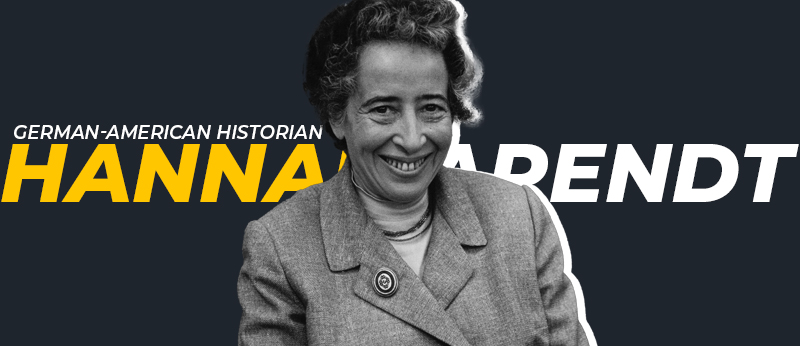Top 10 most inspiring quotes by Hannah Arendt
- The sad truth is that most evil is done by people who never make up their minds to be good or evil.
- The most radical revolutionary will become a conservative the day after the revolution.
- As citizens, we must prevent wrongdoing because the world in which we all live, wrong-doer, wrong sufferer and spectator, is at stake.
- The aim of totalitarian education has never been to instill convictions but to destroy the capacity to form any.
- Clichés, stock phrases, adherence to conventional, standardized codes of expression and conduct have the socially recognized function of protecting us against reality.
- Love, by its very nature, is unworldly, and it is for this reason rather than its rarity that it is not only apolitical but antipolitical, perhaps the most powerful of all antipolitical forces.
- No punishment has ever possessed enough power of deterrence to prevent the commission of crimes.
- Only the mob and the elite can be attracted by the momentum of totalitarianism itself. The masses have to be won by propaganda.
- When all are guilty, no one is; confessions of collective guilt are the best possible safeguard against the discovery of culprits, and the very magnitude of the crime the best excuse for doing nothing.
- And the distinction between violent and non-violent action is that the former is exclusively bent upon the destruction of the old, and the latter is chiefly concerned with the establishment of something new.

Hannah Arendt was a prominent political theorist and philosopher who was born on October 14, 1906, in Hanover, Germany, and passed away on December 4, 1975, in New York City, United States. Her work has had a lasting impact on fields such as political theory, ethics, and the nature of power.
Arendt’s life was marked by significant events and intellectual contributions. She fled Nazi Germany in 1933 and later settled in the United States. Her experiences as a stateless refugee profoundly influenced her thinking on totalitarianism, political authority, and human rights.
Throughout her career, Arendt explored themes such as power, violence, freedom, and individual responsibility. She emphasized the importance of active political participation and public engagement for the preservation of democratic societies. Her most famous work, “The Origins of Totalitarianism,” published in 1951, analyzed the rise of Nazi Germany and the Soviet Union, providing crucial insights into the nature of totalitarian regimes.
Arendt’s other notable works include “The Human Condition” and “Eichmann in Jerusalem: A Report on the Banality of Evil.” In the latter, she examined the trial of Adolf Eichmann, a Nazi war criminal, and coined the phrase “banality of evil” to describe the ordinary bureaucratic mindset that enabled extraordinary acts of cruelty.
Hannah Arendt’s scholarship challenged conventional thinking and provoked intellectual discourse. She emphasized the importance of moral judgment, critical thinking, and the cultivation of a public space where individuals could engage in dialogue and debate. Her ideas continue to shape contemporary political thought, and her legacy as a rigorous and insightful thinker endures to this day.
👉Listen to the best music from all over the world at www.liveonlineradio.net #Hannah_Arendt #quotes #FM #Online_radio #radio #live_online_radio #live #world_radio





